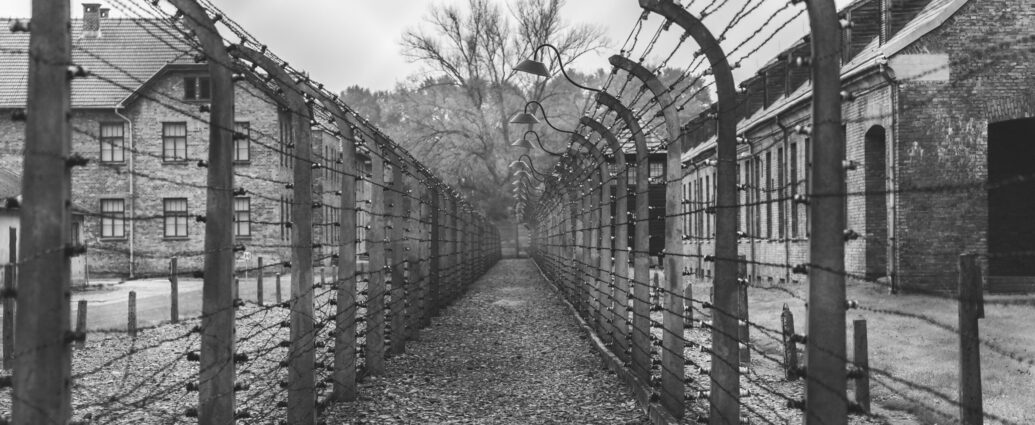Jelena Sofronijevic
Roger Peltzman’s play Dedication takes the audience on a gripping journey of the intergenerational trauma felt by American-Jewish families post-World War Two.
The one-person play recalls the New York pianist’s personal family history of living in war-torn Europe, as he presents his experiences of being a second-generation Holocaust survivor. He uses a clever combination of music, drama, humour and imagery to tell his story.
Second-Generation Trauma
“His powerful performance illustrates the phenomena of ‘presence of absence’ in a family where ghostly figures are inherited only as photographs.”
Peltzman opens the play by stating that children of those who’ve endured trauma are three times more likely to experience PTSD than their parents. His powerful performance illustrates the phenomena of ‘presence of absence’ in a family where ghostly figures are inherited only as photographs, rather than tangible memories.
This tale of pain rippling through generations is anchored around his mother, Beatrice Stern. She was the only member of her family to escape Nazi persecution in Belgium – smuggled out of the country dressed as a nun – prior to World War Two.
Use of Photographs
Throughout the play, a photograph of Peltzman’s mother sits on his piano. It is awarded respectable space on the bare stage, with her determined gaze speaking volumes.
“They provide a sense of guilt and history to a man seeking to establish his identity and belonging.”
Archive photographs of his family are also shot across the back of the stage during the performance to blur the boundaries between past and present. They provide a sense of guilt and history to a man seeking to establish his identity and belonging.
Peltzman’s play highlights ancestral wounds with a picture of his scar. The scar becomes the link between both his mother’s Holocaust escape in Europe and his American upbringing, a link between the past and present.
Survivor’s Guilt
Peltzman is painfully conscious of ‘survivor’s guilt’ – more on his part, than his mother’s. It’s hard for generations that follow such a tragedy to address survivor’s guilt with subtlety, or without feeling self-centred.
Peltzman excels through live music, as a means of connecting with his late Uncle, Nobert Stern, who was praised as a promising ‘Chopin pianist’. Nobert was murdered, at the young age of 21, in Auschwitz during the Holocaust.
Peltzman seeks connection via music because he wants to find affinity with his family and his history.
Intergenerational Parallels
Peltzman’s intergenerational parallels are compelling but not on the nose. The red bricks of the house where his mother’s family went into hiding look strikingly similar to those of his own.
“To be remembered is next to being loved.”
He is also as critical of his mother’s branding of any slight as anti-Jewish prejudice, a mistrust which prevented her deeper integration into her new home in America. In part, that colours Peltzman’s life too.
Peltzman always looks to Jewish academics, poets and musicians for inspiration. Dedication also exhibits a range of musical influences, including The Beatles, classical music, and blues.
Various quotes are shown on the stage, amongst the most potent being from American poet Emily Dickinson: “To be remembered is next to being loved.”’
Family Legacy
The play concludes with Peltzman’s process of placing memorial Stolpersteine stones in Belgium for his family. Here he has played commemorative concerts on his late Uncle’s own piano – and returns to explore these connections today.
But following performances in New York and the Edinburgh Fringe, Marylebone Theatre’s understated music hall feels like a fitting venue for Dedication’s London debut.
Dedication runs at the Marylebone Theatre until 24 June 2023.
READ NEXT:
-
A LITTLE LIFE BY HANYA YANIGIHARA: WHY I WILL NEVER WATCH IT AGAIN
-
THREE MINUTES: A LENGTHENING – FROM HOME MOVIE TO HOLOCAUST HISTORY
-
SPIDERMAN: ACROSS THE SPIDER-VRSE IS THE SEQUEL THE SERIES DESERVES
Featured image courtesy of Karsten Winegeart on Unsplash. No changes were made to this image. Image license found here.

